Mobilisations in Colombia
interested | 23.10.2008 20:47 | Social Struggles
Below is an edited translate article by Simone Bruno, an Italian Journalist who has been present at some of the mobilisations
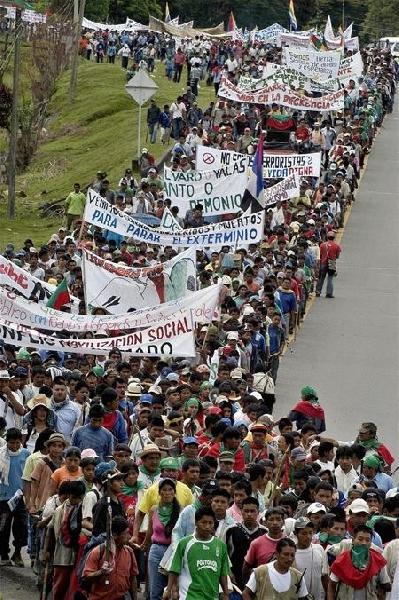
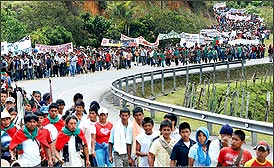
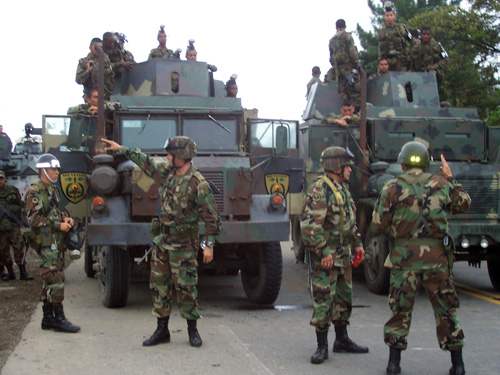
Army blocking the peaceful marches
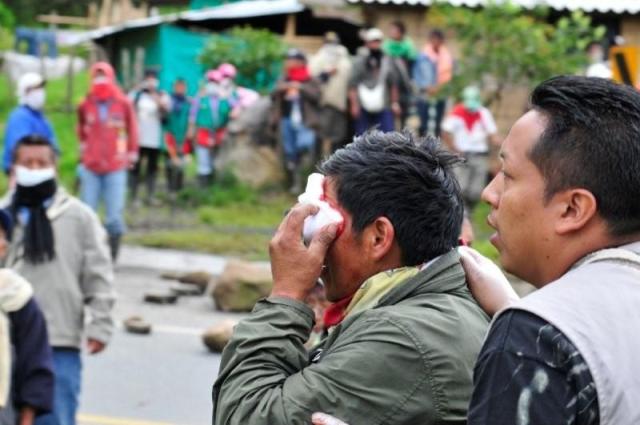
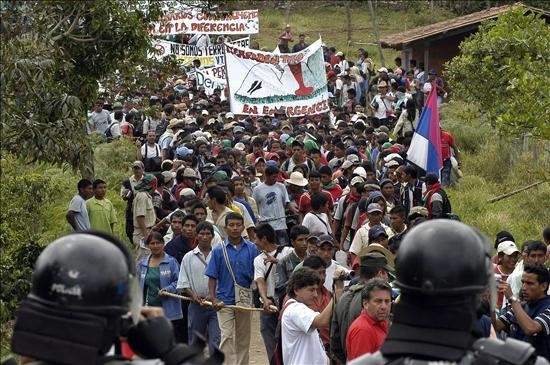
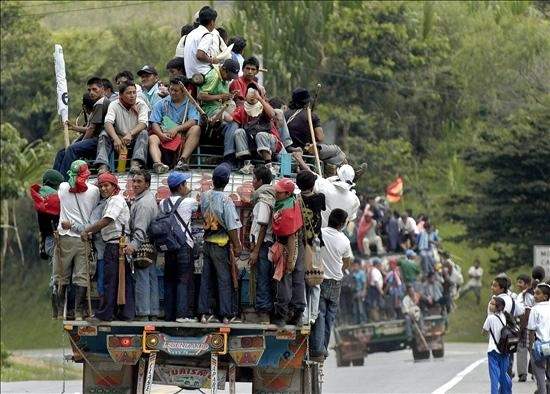
Travelling to join the Minga
October 12 is the so-called day of the race where Western countries celebrate the discovery of America, forgetting that it was already inhabited.
Since October 12th the indigenous have been mobilising, joining the social sectors already mobilized; The judicial sector ended a strike of 43 days yesterday, something unprecedented; the sugar cane cutters in the region of Valle del Cauca have for more than a month been occupying the refineries demanding dignity and direct contracting with a fair wage; truckers ended a long strike a few days ago. The student sector is preparing for an uprising on the 23rd and the Registrar General began an indefinite strike today.
On the 12th October the Minga of the People began, commemorating the 516 years of resistance. Mobilizations are happening around the country and this has been a catalyst for the protest to receive moral and material support nationally and internationally.
The CUT (Central Union of Workers), the largest in the country, the justice sector (ASONAL Judicial), the sugar cane cutters, the education sector, rural areas and many more have joined the Minga.
Once again the 102 Colombian different indigenous groups are proving to be the conscience and moral force of a country that has forgotten how to fight for their rights, drunk on presidential rhetoric. This result is not coincidental, the indigenous Colombians, and most of all the Nasa, has been weaving relationships with other social sectors for years trying to find minimum common points on which to build a series of joint measures to try to break the historical divisions of the Colombians social actors.
The reasons for the fight
At the moment, in several departments in the country (Guajira, Cordoba, Sucre, Atlantico, Chocó, Norte de Santander, Tolima, Caldas, Quindio, Valle del Cauca, Cauca, Tolima, Cauca, Casanare, Meta and Boyaca) thousands of Indigenous continue to mobilize asking for dialogue with the government on 5 points. [1]
One reason for the mobilizations is that the number of indigenous people murdered in recent weeks has increased greatly. According to ONIC (National Indigenous Organization of Colombia): "Over the past six years 1253 indigenous people have been murdered throughout the country [...] every 53 hours an indigenous person is murdered [...] and at least 54,000 have been expelled from their ancestral territories. " Only in the last 15 days, 19 indigenous have been killed.
Another reason is the failure of the State to comply with the signed agreements with the communities. An example; that of the Nasa people. On December 21, 1991, 20 Indigenous were massacred with the complicity of the security forces in what is known as the slaughter of the Nile. The state was responsible for this slaughter. This has been recognized internationally and they committed to comply with the recommendations of the IACHR (Inter-American Commission on Human Rights), around justice, individual and collective reparations.
The former President Ernesto Samper himself apologized publicly on behalf of the Colombian State to the victims of this slaughter, their families and the Nasa people. These agreements have not been respected even though the current government pledged on September 13, 2005 to implement all outstanding obligations within a maximum of two years. Nor have they fulfilled with the requirement to return 15,000 acres to the Nasa people.
The Indigenous also oppose several laws including the Rural Statute, the Mining Code, ‘waters plans’(privatisation), the law of forests, all driven by the Uribe government, who "choose to promote the economic interests and contribute to the territorial ruin," according to the ONIC. These laws are opposed to Article 120 of the constitution of 1991 which states: "the exploitation of natural resources on indigenous lands by the State must happen without damaging their cultural, social and economic status, and similarly, consultation with the respective indigenous communities must occur."
In the past 6 years, according to ONIC, 53,885 Indigenous have had to leave their lands and18 Colombian indigenous groups are at risk of disappearing because they are now fewer than 200 inhabitants. Ten have less than 100. As they reiterated: "an indigenous without land is a dead indigenous."
These rights to land and life are contained in the UN Declaration on the Rights of Indigenous Peoples, adopted in September 2007, signed by all Latin American countries except Colombia. Today, the Indigenous also mobilize for their approval in this country.
These are the reasons behind the great mobilization of Indigenous calling for a direct meeting with President Uribe.
ONIC’s communications give information about the mobilisations around the country [2] It has been toughest in the La María -Piendamó (Cauca) where 20,000 Indigenous from the Guambiana, Nasa, Yanacona, Totoró, Coconuco and Eperara-Siapirara ethnic groups have taken the Panamerican highway between Cali and Popayan, to draw national attention
The state has sent the riot squad (ESMAD), stating that in 10 minutes it will clear the road. The resistance of the Indigenous has continued for more than 24 hours and after two days, the road was once again taken.
In La María an extremely violent confrontation took place during which there have been more than 70 wounded and two dead, one of whom was Ramos Valencia, coming from Tacueyó reserve, who received a bullet in the head, that went straigh through.
What has happened in this reserve has been extremely serious. The National Police, under the responsibility of President Álvaro Uribe, the governor of Cauca - Guillermo Gonzalez Mosquera and ESMAD commander - Colonel Jorge Cartagena, have used unconventional weapons against the indigenous population who defended only with sticks and stones. The police forces, in addition to gas, machetes and sticks, have used rifles and bullets shot that are a mixture of black powder, nails, tacks and glass that, when detonated, generate a barrage of shrapnel. Some of these unconventional unused grenades have been delivered to international delegates who have been present since Wednesday.
The international community realized the seriousness of the facts and is accompanying the mobilization. Officials have come from the embassies of Canada, Sweden, Switzerland, the United States and Spain and representatives of UN and the European Community, UNHCR, UNICEF and OCHA. They have asked the security forces not to invade the Maria reserve because, according to the Constitution, the indigenous authorities are state authority in their reserves. And the reserves cannot be searched without prior indigenous approval. The security forces, once they had recovered the road, infiltrated the reserve and burned several houses.
In addition to the attack with bullets, the indigenous community have been victims of a shameful media offensive.
Media offensive
Several media outlet have done nothing more than quote government sources and without bothering to verify this information, accuse the Indigenous of using firearms and of being infiltrated by FARC guerrillas.
Against these lies speak the truth, the dead and injured indigenous documented in photos. The process of occupying the road is a decision that comes from below, the community members in assembly proposed to the governors of their town councils to take action, they meet, decide and report to the assemblies, there are no guerrillas, there are collective decisions made by conscious people.
The criminalization of protest is a much-practiced exercise in Colombia where the FARC become the excuse to crush the social movements. According to the President, guerrillas are students, sugar cane cutters, judges, indigenous, teachers, lorry drivers and peasants. If so, his Democratic Security policy would be a real failure, with the entire country infiltrated by the guerrillas.
The same people who accuse the peasants of being guerrillas are the ones who are prosecuted for paramilitary activity, as evidenced by the 60 MPs involved in the parapolitica scandal, or the former governor of Cauca, Juan Jose Chaux Mosquera, who attacked the Nasa indigenous. Chaux, after being governor, was appointed by President Uribe, to be the ambassador to the Dominican Republic. He was forced to resign for his proven links with the paramilitaries.
While we finish this article news arrives that the road in la María has been occupied again and the police and army are attacking again.
Simone Bruno, Italian Journalist.
[1] Main Issues for the Agenda of Dialogue
These themes encompass many other issues that can fit within each agenda point. We present these more as chapters of the dialogue, whereby each sector involved in the dialogue can have input on the specific issues and points that should be discussed. We recognize that this is simply the beginning of a longer process of listening, absorbing, analyzing and ordering a detailed agenda for the urgent transformations that are necessary. The agenda should not be one of exclusion. All the issues and points of all the people should be considered. The agenda that we propose is the following:
1. We reject the Economic Model of global transnational capital and the Free Trade Agreements strategies that have been negotiated with the United States, Canada and the European nations. These treaties are part of a nefarious strategy on the part of major global economic powers. The process of negotiation and the results of these agreements are a threat to our cultures and our territories, our sovereignty. They surrender our collective resources to corporate interests and trans-nationals, and directly threaten our Mother Earth. These are not treaties between people but against people;
2. No more war, no more terror; we reject the government’s so-called “Democratic Security Strategy,” Plan Colombia, the dirty war, para-politics, he militarization of society and the criminalization of popular protest. We call on truth, justice and reparations for the crimes committed against the people. War is not the answer. And those people who have committed crimes against the people, such as former Cauca governor Juan José Chaux Mosquera, should be judged so that their bad examples will never again be repeated and the victims will be compensated;
3. No to the Constitutional Counter-reforms and legislation of displacement that has been implemented under the current government, measures that surrender our rights to private interests, and that submit us to silence and forced labor, to exclusion and ultimately death.
4. Demand the observance and strict abidance to the agreements and obligations that guarantee the rights and freedoms of all people such as the ILO agreement 169, the UN Declaration on Human Rights of Indigenous peoples and others.
5. The creation of mechanisms of sovereignty, peace and coexistence in order to develop and make reality our agenda through a permanent Congress of the Peoples.
[2]
In Tolima, some 2,000 indigenous Pijaos Pots and march between El Guamo and El Espinal in a peaceful manner, as well as another 400 indigenous Embera Chami in Armenia, the capital of Quindio. In Caldas, the focus is on the town of Riosucio, and indigenous people in El Choco maintain the peaceful occupation of the Ombudsman's Office in Quibdo. Inside the headquarters of the Office there are more than 300 indigenous Embera Dóvida and Katie working on commissions with regional authorities on issues such as health, education and food security. Outside, a similar number of Indigenous support the occupation peacefully.
In Valle del Cauca on the road that connects Palmira with Popayan there are over one thousand indigenous Emberas Chami, Eperaras Siapidaras and Wannan. In Huila, 9 “chivas” have been detained by authorities.
In Guajira: despite the winter and disasters in many of the ranches in Manauare and Riohacha, the Wayúu are mobilized on route to the capital of La Guajira. Marchers, since Friday, come healing the territory with songs, dances, ceremonies and the reaffirmation of the word. They will be met by indigenous Wiwa, indigenous students and other sectors at the University of La Guajira.
In Cordoba: Zenú and thousands of indigenous from Zenú, Emberas Katios del Alto Sinú and Alto San Jorge, join the Minga minga, for the dignity and rights of indigenous peoples.
In total, it is estimated that around 40 thousand Indigenous have come to municipal roads and schools to join the Minga National Indigenous Resistance.
En el Valle del Cauca, en la vía que conecta a Palmira con Popayán, la Florida y Pradera, en la glorieta del puente de ese lugar, están más de mil indígenas Emberas Chami, Eperaras Siapidaras y Wannan. En Huila, 9 "chivas" que salían desde los resguardos han sido detenidas por las autoridades, luego de requisar a cada uno de los más de 500 indígenas, no los quisieron dejar pasar.
interested